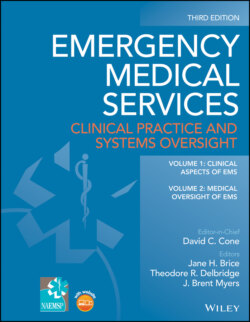Читать книгу Emergency Medical Services - Группа авторов - Страница 369
Refusal of care after resolution of AMS
ОглавлениеEMS clinicians will “fix” many patients with AMS on the scene, especially those with relatively straightforward, isolated conditions such as hypoglycemia or opioid overdose. One of the greatest challenges with these patients is determining who has a single, self‐limited process that has been remedied and is unlikely to recur and therefore may be safe to not be transported to the ED or otherwise refuse care, and who requires further treatment or extended observation and therefore should be transported to the ED. Many hypoglycemic patients who have improvement in mental status with field treatment will refuse further medical care and transport. This practice has been shown to be generally safe if certain criteria are met [17, 18] (see Chapter 20).
In addition, individuals who recover after treatment with naloxone may feel well, wish to refuse transport to the emergency department, and have the capacity to do so. However, because of the relatively short half‐life of naloxone, there is concern that these patients may later develop recurrence of symptoms. Experience in EMS systems that have been fully reversing opioid overdose and allowing transport refusals suggests that the risk of clinically significant resedation is small and that adverse events due to rebound toxicity are rare [19–21]. Nonetheless, EMS encounters for opioid overdose patients do provide an opportunity to identify individuals at risk for dangerous substance use and subsequent opioid overdose [22].
